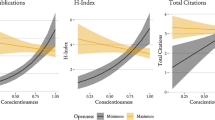Abstract
Factors contributing to citation impact in social-personality psychology were examined in a bibliometric study of articles published in the field’s three major journals. Impact was operationalized as citations accrued over 10 years by 308 articles published in 1996, and predictors were assessed using multiple databases and trained coders. Predictors included author characteristics (i.e., number, gender, nationality, eminence), institutional factors (i.e., university prestige, journal prestige, grant support), features of article organization (i.e., title characteristics, number of studies, figures and tables, number and recency of references), and research approach (i.e., topic area, methodology). Multivariate analyses demonstrated several strong predictors of impact, including first author eminence, having a more senior later author, journal prestige, article length, and number and recency of references. Many other variables — e.g., author gender and nationality, collaboration, university prestige, grant support, title catchiness, number of studies, experimental vs. correlational methodology, topic area — did not predict impact.
Similar content being viewed by others
References
Adair, J. G., Vohra, N. (2003), The explosion of knowledge, references, and citations: Psychology’s unique response to a crisis. American Psychologist, 58: 15–23.
Baldi, S. (1998), Normative versus social constructivist process in the allocation of citations: A network-analytic model. American Sociological Review, 63: 829–846.
Cicchetti, D. V. (1991), The reliability of peer-review for manuscripts and grant submissions: A cross-disciplinary investigation. Behavioral and Brain Sciences, 14: 119–134.
Cleveland, W. S. (1984), Graphs in scientific publications. American Statistician, 38: 261–269.
Cole, S. (1983), The hierarchy of the sciences? American Journal of Sociology, 89: 111–139.
Cronin, B., Overfelt, K. (1994), Citation-based auditing of academic performance. Journal of the American Society for Information Science, 45: 61–72.
Cronin, B., Shaw, D. (1999), Citation, funding acknowledgement and author nationality in four information science journals. Journal of Documentation, 55: 402–408.
Dillon, J. T. (1981), The emergence of the colon: An empirical correlate of scholarship. American Psychologist, 36: 879–884.
Douglas, R. J. (1992), How to write a highly cited article without even trying. Psychological Bulletin, 112: 405–408.
Ferber, M. A. (1986), Citations: Are they an objective measure of scholarly merit? Signs, 11: 381–389.
Garfield, E. (1987), Mapping the world of science: Is citation analysis a legitimate evaluation tool? In: D. N. Jackson, J. P. Rushton (Eds), Scientific Excellence: Origins and Assessment. Sage Publications, pp. 98–128.
Gottfredson, S. D. (1978), Evaluating psychological research reports: Dimensions, reliability, and correlates of quality judgments. American Psychologist, 33: 920–934.
Greenwald, A. S., Shuh, E. S. (1994), An ethnic bias in scientific citations. European Journal of Social Psychology, 24: 623–639.
Harter, S. P., Hooten, P. A. (1992), Information-science and scientists — JASIS, 1972–1990. Journal of the American Society for Information Science, 43: 583–593.
Helmreich, R. L., Spence, J. T., Beane, W. E., Lucker, G. W., Matthews, K. A. (1980), Making it in academic psychology: Demographic and personality correlates of attainment. Journal of Personality and Social Psychology, 39: 896–908.
Hudson, J. (2007), Be known by the company you keep: Citations — quality or chance? Scientometrics, 71: 231–238.
Lange, L. (1985), Effects of disciplines and countries on citation habits: An analysis of empirical papers in behavioral sciences. Scientometrics, 8: 205–215.
Lee, J. D., Vicente, K. J., Cassano, A., Shearer, A. (2003), Can scientific impact be judged prospectively? A bibliometric test of Simonton’s model of creative productivity. Scientometrics, 56: 223–232.
Lewison, G., Hartley, J. (2005), What’s in a title? Numbers of words and the presence of colons. Scientometrics, 63: 341–356.
Lindsey, D. (1988), Assessing precision in the manuscript review process: A little better than a dice roll. Scientometrics, 14: 75–82.
McGarty, C. (2000), The citation impact factor in social psychology: A bad statistic that encourages bad science? Current Research in Social Psychology, 5: 1–16.
Merton, R. K. (1968). The “Matthew effect’ in science. Science, 159: 56–63.
National Research Council (1995), Ranking of U.S.A. PhD programs in psychology. Retrieved from http://www.socialpsychology.org/ranking.htm
Over, R. (1990), The scholarly impact of articles published by men and women in psychological journals. Scientometrics, 18: 71–80.
Patsopoulos, N. A., Analatos, A. A., Ioannidis, J. P. A. (2005), Relative citation impact of various study designs in the health sciences. JAMA: Journal of the American Medical Association, 293: 2362–2366.
Peters, D. P., Ceci, S. J. (1982), Peer review practices of psychological journals: The fate of published articles, submitted again. Behavioral and Brain Sciences, 5: 187–255.
Petty, R. E., Fleming, M. A., Fabrigar, L. R. (1999), The review process at PSPB: Correlates of interreviewer agreement and manuscript acceptance. Personality and Social Psychology Bulletin, 25: 188–203.
Quinones-Vidal, E., Lopez-Garcia, J. J., Penaranda-Ortega, M., Tortose-Gil, F. (2004). The nature of social and personality psychology as reflected in JPSP, 1965–2000. Journal of Personality and Social Psychology, 86: 435–452.
Shadish, W. R. Jr. (1989), The perception and evaluation of quality in science. In: B. Gholson, W. R. Shadish, Jr, R. A. Neimeyer, A. C. Houts (Eds), The Psychology of Science: Contributions to Metascience. Cambridge University Press, pp. 383–436.
Shanghai Jiao Tong University (2005), Academic ranking of world universities. Retrieved from http://www.ed.sjtu.edu.cn/rank/2005/ARWU2005Main.htm
Simonton, D. K. (2006), Scientific status of disciplines, individuals, and ideas: Empirical analyses of the potential impact of theory. Review of General Psychology, 10: 98–112.
Smart, J. C., Bayer, A. E. (1986), Author collaboration and impact: A note on citation rates of single and multiple authored articles. Scientometrics, 10: 297–305.
Sternberg, R. J., Gordeeva, T. (1996), The anatomy of impact: What makes an article influential? Psychological Science, 7: 69–75.
Stewart, J. A. (1983), Achievement and ascriptive processes in the recognition of scientific articles. Social Forces, 62: 166–189.
Author information
Authors and Affiliations
Corresponding author
Rights and permissions
About this article
Cite this article
Haslam, N., Ban, L., Kaufmann, L. et al. What makes an article influential? Predicting impact in social and personality psychology. Scientometrics 76, 169–185 (2008). https://doi.org/10.1007/s11192-007-1892-8
Received:
Published:
Issue Date:
DOI: https://doi.org/10.1007/s11192-007-1892-8




